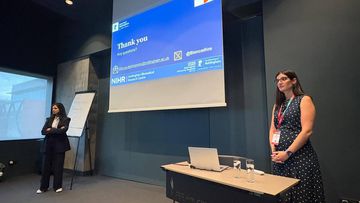Carer's Week 2023
NewsThis week is Carer's Week - an annual campaign to highlight the essential role that unpaid, or informal carers have in the lives of those living with an illness or disability, to acknowledge the depth of challenge that they can encounter on a daily basis - and to think about how we can support them in our own professional and personal lives.
As healthcare professionals, there is a real need to consider and involve those in a caring role, for their own health and wellbeing and the health of those around them.
However, it is important to recognise that someone in a caring role may not recognise this, or identify themselves as a 'carer'. The Carers and Hospital Discharge Toolkit launched in February noted:
Language is key - If you say “Do you have a carer?” or “Are you a carer?” your results will be very different to if you ask “Is there anyone who helps to support you when you need help at home?
Carers and Hospital Discharge (2023) p12
In August last year, we spoke to James Townsend, CEO and co-founder of Mobilise after the new MS NICE guidance made support to carers from the point of a persons' diagnosis and throughout their lives, as core policy.
Supporting and equipping the carer to be able to carry out their caring role in a supported way is absolutely in line with the clinical outcomes we're looking for.
We also need to remember that the carer is a specialist… very often they will know more about the condition and that person's experience of the condition than the person themselves - involving the carer in the conversation is not only a polite, reasonable and sensible thing to do but it's also going to improve clinical outcomes.
James Townsend, CEO of Mobilise
Simple steps to carer inclusion and support
James brings a unique insight to the importance of supporting carers, due to his work through Mobilise, a non-profit organisation working with local authorities to support carers through online channels, and because he has personal experience from childhood of being an informal carer.
The conversation with him drew out several simple ways that healthcare professionals can consider, involve and support those in a caring role - from the point of diagnosis all the way through the lifecourse. These are all available with the full interview online.
Two very simple yet effective things to consider adding into your practice might be:
Including a brief question in your pre-clinic questionnaire: 'We know this condition can impact your whole family - do you think any of your loved ones would value support?'
Include comments about or from those in a caring role in notes shared with the wider MS team, hospital and community teams, GPs - and any other relevant professionals involved in that individual's care and support.
A simple step you could make this week is letting carers know about Mobilise's online Cuppas for Carers available all this week. They're also signposting to a range of other activities on their website.
'Grabbing a minute' with a carer on their own
However, we also know that involving carers in a discussion is not always as straightforward as it sounds, and that looking for opportunities to speak to a loved one in a caring role away from the person they are supported can be very helpful.
When we spoke to Prof Annette Hand in 2021, she talked about the importance of 'grabbing a minute' with a carer away from their loved one to better understand both their own needs, and any differences of perspective they have on how the person they support is experiencing their condition.
For me, it's about talking to carers in clinic, asking about their needs, their challenges, and encouraging discussions about advanced decisions, end of life preferences, the best care settings, even when it's hard. Making sure that these conversations with carers are included in notes and records is really important too.
Annette Hand, professor of nursing
In recognition of this need, the Parkinson's Excellence Network launched a course in 2022 centred around how to involve carers in treatment decisions and care plans, and to support them as individuals. Nicole Kirbyshire, a service designer for Parkinson's Connect at Parkinson's UK, talked to us early last year about the new course.
We know that family care partners need to be able to share information about their loved one as part of clinical conversations and care planning. The challenge is often in connecting with them in a way that is comfortable for them, and won't impact their relationship with their loved one. Sometimes they might feel that they're being disloyal by sharing something…
Nicole Kirbyshire, Parkinson's UK
Whilst the course is designed with Parkinson's in mind, much of the content is relevant regardless of the speciality you work in, so accessing the free online course and considering how you support and involve carers in your work could be a great step to take this Carer's Week.
Related articles
Encouraging excellence, developing leaders, inspiring change
MS Academy was established in 2016 and in that time has accomplished a huge amount with exciting feedback demonstrating delegates feel inspired and energised along their personal and service development journeys. The various different levels of specialist MS training we offer are dedicated to case-based learning and practical application of cutting edge research.


